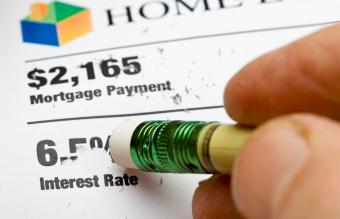
Are you in the market for a home loan but experiencing difficulty due to your credit score? Fortunately, government-backed programs and sub-prime mortgage products exist for which you may qualify.
What Constitutes a Low Credit Score?
Credit scores range from 300 to 850, but lenders like to see a three-digit number on the upper end of the spectrum, since this conveys your ability to handle debt responsibly. However, having a low credit score, which is between 501 and 660 according to Bankrate, may make it a bit more difficult to qualify for a traditional loan product with a mainstream lender.
Mortgage Options for Bad Credit
Here are some loan options worth considering if your credit is less than perfect.
FHA Loans
The United States Federal Housing Administration (FHA) offers these loans to individuals with bad credit through FHA-approved lenders around the nation. According to the HUD.gov, all you need is a 580 credit score to qualify for a loan and the low down payment option of only 3.5 percent. If your score is between 500 and 579, you may still qualify, but a 10 percent down payment is required for consideration. Also, past bankruptcies, judgements, and foreclosures will not necessarily disqualify you if certain conditions are met.
FHA loans are also a viable option for potential borrowers plagued with credit issues because they often come with competitive interest rates, unlike traditional loans that ding you with a higher interest rate based on riskiness. In addition, the accompanying fees, including closing costs, are comparable to those of other mortgage products on the market.
However, FHA loan recipients must pay for mortgage insurance if they make a down payment of less than 20 percent of the total purchase price. This amount ranges from 0.5 to 1% of the total loan value and must be paid until your loan-to-value ratio equals 80 percent, according to Investopedia. Your loan-to-value ratio can be calculated by dividing the appraised value of property by the mortgage amount, the article adds.
VA Loans
Offered by the Department of Veteran Affairs, these loans allow past and current members of the armed forces to qualify with less than perfect credit. There is a minimum FICO score requirement, which varies from lender to lender, but usually is around 620, according to Veterans United Home Loans.
Among the benefits of VA loans are:
- Competitive interest rates
- The absence of a down payment if you qualify for 100% financing
- No private mortgage insurance
- No minimum income requirement
However, there are certain loan limits that may apply, so it may not be a viable option if you are seeking a pricey home.
Private Lenders
You can also explore mortgage options offered by private bad credit mortgage lenders, such as Loan Leaders of America and Patriot Lending Services, Inc., if you have less than perfect credit.
Unfortunately, funding may be limited to select states. Furthermore, the interest rate on loan products offered by these lenders may be substantially higher than other mortgage programs backed by the federal government.
Other Feasible Options
If the mortgage search is not working out for you, you may have other options, as well.
Rent-to-Own
Contact a realtor to learn about rent-to-own properties that are available in your desired area of residence. Under this arrangement, you will remit monthly payments for a specified period that will count towards your down payment should you exercise the option to buy when the time comes. You will need to seek approval from your financial institution to ensure this is a suitable arrangement before moving forward.
Owner Financing
You may be fortunate enough to find a property that is paid off with an owner who is willing to extend financing to you. There is a possibility you will need to remit a substantial down payment to secure the property, but you will be able to bypass the stringent eligibility requirements imposed by traditional lenders.
The Application Process
Since the mortgage application process varies by lender, it is important to reach out to them beforehand to learn more about their process and confirm which documents you will need.
Required Documentation
Bankrate suggests you have the following on hand to start with:
- W-2 forms from the past two years (if you receive a paycheck)
- 1099 forms and profit and loss statements from the past two years (if you are self-employed)
- Recent paycheck stubs
- Tax returns form the past two years
- List of debts, including credit cards, student loans, auto loans, and child support obligations
- List of assets, including bank statements, mutual fund statements, real estate and automobile titles, brokerage statements, and any other applicable investments or assets
- Canceled checks for current rent or mortgage obligations
Also, keep in mind that some loan programs may have more exhaustive documentation requirements than others.
An Important Consideration
In most instances, lower credit scores equate to higher interest rates as a result of the risk you pose, as perceived by the lender. It may be in your best interest to refrain from securing a mortgage loan until you improve your credit score. If you are adamant about continuing your search, bring a mortgage broker on board to help you find lenders that may be willing to work with you.







